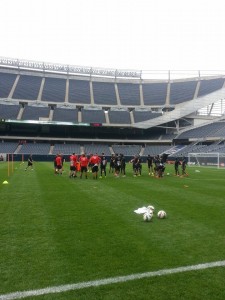Football training is an exciting and rewarding experience for players of all levels. Whether you’re just starting out or aiming for professional success, there are certain things you can expect during your football training sessions. In this guide, we’ll walk you through what to anticipate, helping you prepare mentally and physically for your time on the field.
1. Physical Conditioning:
One of the first things you’ll encounter in football training is physical conditioning. This involves exercises to improve your strength, speed, agility, and endurance. Expect activities like running drills, weightlifting, and agility exercises designed to enhance your overall physical capabilities.
While it may be challenging at times, remember that conditioning is essential for peak performance on the field. You might also experience things like muscle and bodily sores, all of these are normal, especially since your body had a sudden change in routine. They usually only last about three days and you can heal faster if you use cold compress on them every night.
2. Skill Development:
Football training is all about honing your skills as a player. You can expect to work on fundamental techniques such as passing, dribbling, shooting, and tackling. Coaches will provide guidance and feedback to help you refine your skills and become a more effective player.
Be prepared to practice these skills repeatedly to achieve mastery and consistency in your performance. If in any case, you feel discouraged by the people around your who seem to already be so good at it, you make to keep in mind to not compare yourself to them because everyone progresses at different rates.
3. Tactical Understanding:
Understanding the tactical aspects of the game is crucial for success on the football field. During training, you’ll learn about offensive and defensive strategies, team formations, and positional responsibilities. Coaches will explain the importance of teamwork, communication, and decision-making in executing these tactics effectively. Pay close attention to tactical instructions and actively participate in drills to improve your understanding of the game.
4. Team Bonding:
Football is a team sport, and building strong bonds with your teammates is essential for success. Training sessions provide opportunities to work together, support one another, and develop camaraderie both on and off the field. Expect team-building exercises, group challenges, and bonding activities to foster a sense of unity and cooperation among players. Embrace these opportunities to strengthen your relationships with your teammates and contribute to a positive team environment.
5. Mental Preparation:
Football training is not just about physical prowess; it also requires mental strength and resilience. Expect sessions focused on mental preparation, including visualization techniques, goal-setting exercises, and strategies for overcoming adversity. Coaches will emphasize the importance of focus, confidence, and a positive mindset in achieving your goals as a player. Practice mental conditioning alongside physical training to enhance your overall performance on the field.
6. Feedback and Improvement
Feedback is a valuable part of football training that helps players identify areas for improvement and make necessary adjustments. Expect to receive feedback from coaches, teammates, and video analysis sessions to assess your performance objectively. Use this feedback constructively to refine your skills, correct mistakes, and strive for continuous improvement as a player. Approach feedback with an open mind and a willingness to learn and grow.
Conclusion
Football training is a dynamic and multifaceted process that encompasses physical, technical, tactical, and mental elements of the game. By knowing what to expect, you can approach your training sessions with confidence and purpose. Embrace the challenges, seize the opportunities for growth, and enjoy the journey as you strive to reach your full potential as a football player.
